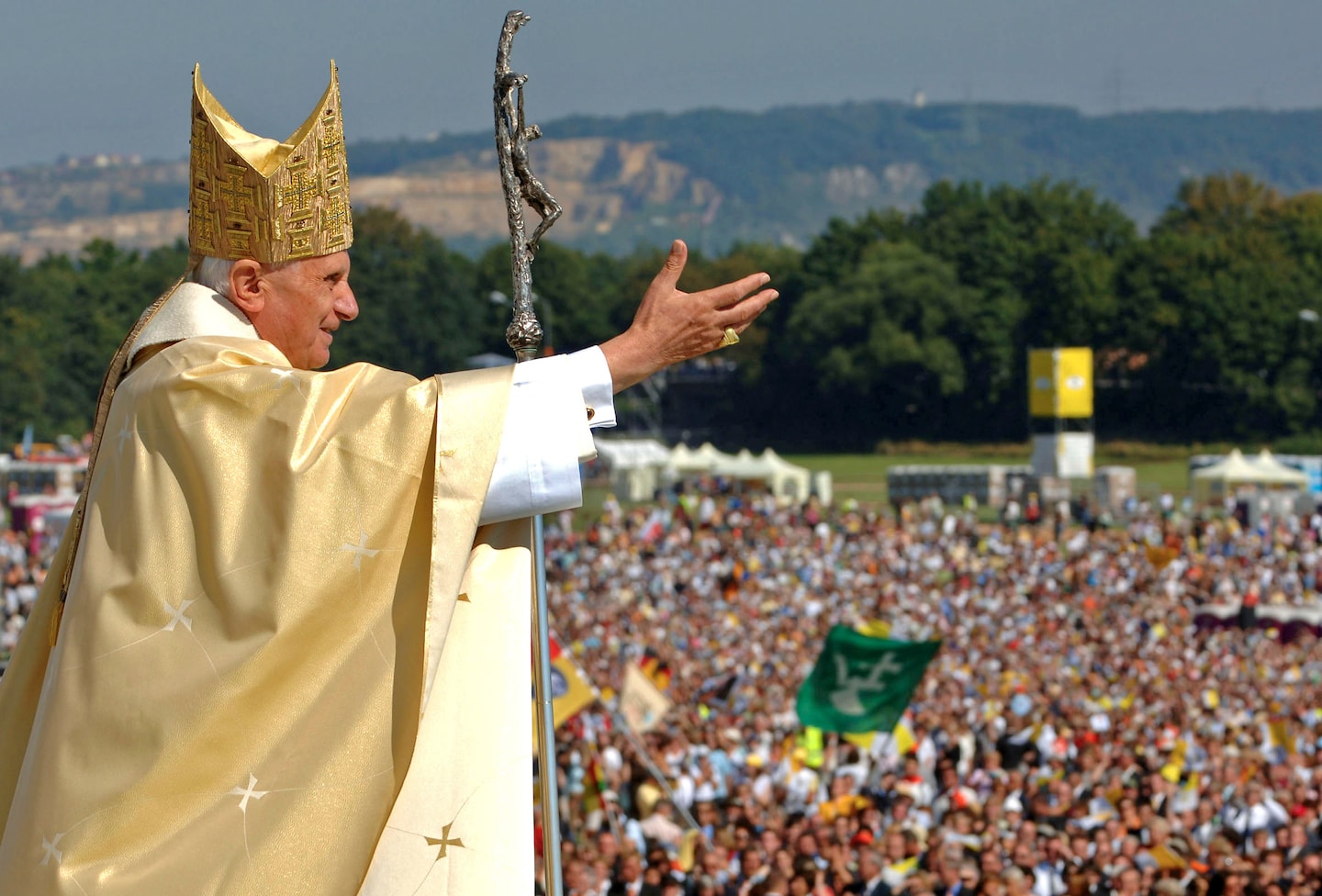It’s a part of Benedict’s legacy, as one of Catholicism’s foremost conservatives, that his viewpoint has lost ground above all in his home country.
If anything, Benedict’s version of Catholicism has more currency in the United States, which has emerged during Francis’s pontificate as the epicenter of global traditionalism.
“If you look at the news right now in Germany, they’ll talk about [Benedict’s] health, but just with some short impressions from Rome — nothing from Berlin or Munich,” said Gregor Maria Hoff, a theologian involved with the German church’s reform process. “It is not that touching for Germans.”
With the given name of Joseph Ratzinger, the man who would become the first German pope in 1,000 years was baptized in a small Bavarian town, came of age during World War II, was mandated as a teen to join the Hitler Youth, and later cited wartime cruelties as one of the reasons he was attracted to religion. He gained prominence in the church as a theologian at German universities, and even after moving to Rome — becoming a powerful cardinal, then pontiff — he said he tended to read books mostly in German. “Being German is a very strong part of my cultural identity,” he said.
But during the years Benedict has spent in Rome — particularly in his decade as retired pope — the German church, which long had a liberal streak, has undergone massive changes that have turned it into something of a testing ground for how far progressivism can go.
A 2018 church-commission investigation into seven decades of church abuse, documenting cases involving more than 1,600 clerics, provoked a crisis of confidence among German Catholics, including bishops, who acknowledged rot at the core of the system. They, in turn, drew up a multiyear process to reassess some of the most fundamental — and controversial — questions in the church.
Though the series of meetings is not yet finished, participants, including German bishops, have called for the church to bless same-sex relationships, while requesting that the pope loosen rules on celibacy and allow for the ordination of women. All would mark historic shifts for the Catholic Church and would need to be approved by Rome.
In the United States, some in the largely conservative Catholic leadership have issued specific warnings for Germany or even spoken of the possibility of schism if changes come to pass.
Francis, meanwhile, finds himself in a tough spot. He has espoused a vision for the church that includes more autonomy for national-level churches, and he has been more conciliatory than his predecessors to groups such as the LGBTQ community. But his lieutenants in the Vatican are clearly alarmed. Last month, in meetings with German bishops in Rome, Vatican higher-ups called for a “moratorium” on the process; the German bishops declined.
“There’s fear [in the Vatican] that this will be like a fire that spreads elsewhere,” Georg Bätzing, the head of the German bishops’ conference, told reporters. “We are Catholic. But we want to be Catholic in a different way.”
Benedict, who has been frail for years and vowed to remain silent on church affairs, has not spoken about the German process, known as the synodal way. But one like-minded German cardinal in the Vatican, Gerhard Müller, has regularly criticized it. Benedict’s biographer, Peter Seewald, said in an interview with The Washington Post that one can “imagine” how Benedict feels.
“This is actually exactly the opposite of what Ratzinger proclaimed all his life as a theologian and what he fought for,” Seewald said.
More than taking a stand on any one issue, Benedict holds a universal feeling about the faith: that it shouldn’t bend to cultural whims. As pope, he warned about “aggressive forms of secularism” and worried about the church making concessions to the norms of modern culture that might weaken the eternal truths of Catholicism.
“We need a moral force in our time,” Benedict said in 2011, at the beginning of a visit to Germany.
Though the gap between Benedict and the German church has widened, he had long been something of an outlier among peers. Seewald said Benedict had a “difficult” relationship with his country’s church for decades, based first on differences over how to interpret the Second Vatican Council, and later based on tensions over student protests in the late 1960s.
Relative to the church in Italy, for instance, the German church has always had a reformist streak. Scholars say that is in part because of the influence of Protestantism, even centuries after the Reformation. Germany also has a network of powerful lay Catholic organizations, diffusing the power of clerics. The German church, though imperiled, is one of the wealthiest national churches, thanks to a state-backed church tax.
“Ratzinger sees in Germany a church of facades that is no longer filled with faith,” Seewald said.
He has had some great moments in Germany. When he was chosen as pope in 2005, the Bild tabloid, as if hailing a national victory, blared the headline: Wir Sind Papst! (We are pope!)
Months later, Benedict enjoyed a triumphant visit to Cologne, celebrating a Mass in front of 1 million people.
But his reputation, even among some supporters, has been damaged. Earlier this year, a church-commissioned investigation accused him of wrongdoing in several cases when he led the archdiocese in Munich from 1977 until 1982. In one instance, the investigation said, Benedict knowingly accepted a priest into his archdiocese even after the cleric had been convicted of sexual abuse in a criminal court.
The law firm that carried out the probe said Benedict’s claims of having no knowledge of the cases were not credible.
Benedict soon after had to correct the record, admitting his presence at a 1980 meeting in which church officials discussed a predator priest.
“Even people who are friendly to Ratzinger are very disappointed that he didn’t say the truth,” said Christian Weisner, a spokesman for Wir Sind Kirche, a movement advocating for church reforms. Weisner cited his elderly in-laws, who spent their lives as active parishioners. “They are disappointed in Ratzinger and also in the whole church,” he said.



